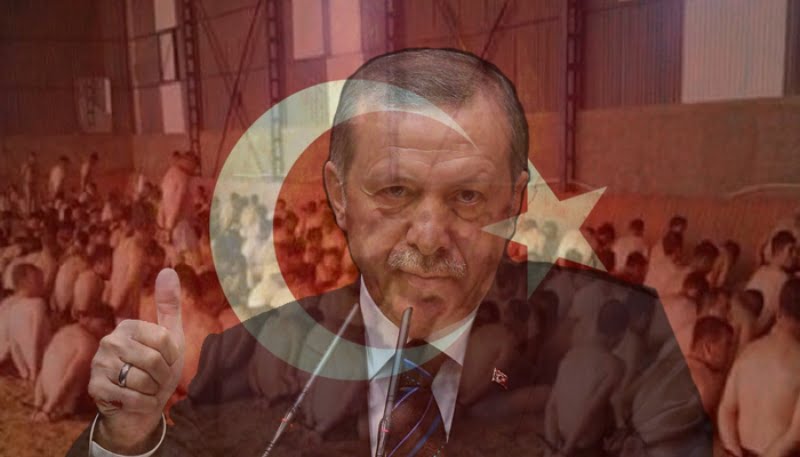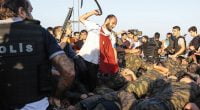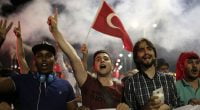Crimes Against Humanity in Erdogan’s Turkey

Date posted: February 26, 2021
Alfred de Zayas
On September 15, Turkish diplomat Volkan Bozkir took over the office of the chairperson of the United Nations General Assembly — the deliberative body of an organization tasked with protecting human rights — a tragic irony, as his country stands as one of the worst rights offenders in the world. In Turkey’s hands, that gavel is a bludgeon.
Turkish President Recep Tayyip Erdogan bears personal responsibility for countless violations of the International Covenant on Civil and Political Rights, the Convention Against Torture as well as the European Convention on Human Rights and Fundamental Freedoms and its Protocols.
As a result, Freedom House has downgraded Turkey to its lowest ranking: “Not Free.” The Committee to Protect Journalists considers it among the world’s worst jailers of journalists. Amnesty International criticized a two-year state of emergency to “consolidate draconian government powers to silence critical voices and strip away fundamental rights and freedoms” and not reversing those measures afterward.
While Erdogan has pursued a number of groups — academics, journalists, Kurds — the primary target of these abuses are participants of Hizmet, a peaceful civil society movement with a long record of promoting education, community service and interfaith dialogue. The movement is inspired by the work and words of Fethullah Gülen, an emeritus preacher in self-imposed exile in Pennsylvania, who has been declared by Erdogan as an enemy of the Turkish state.
Things escalated on the tragic night of July 15, 2016, when a small part of the Turkish military was mobilized for what amounted to a weak coup attempt, leading to speculation that Erdogan staged it himself. Without investigation or evidence, Erdogan accused Gülen of orchestrating it. Both Gülen and Hizmet participants have forcefully denied any involvement and condemned the attempt. When Turkey requested Gülen’s extradition, the United States Justice Department conducted an extensive review of the evidence presented by the Turkish government and found no basis for extradition.
Since then, Erdogan has repeated his baseless contentions on every available platform and used the events to persecute hundreds of thousands of innocent people through mass arrests, seizures of private property, indefinite detention, and even torture.
The crimes committed against Hizmet followers, including murder and kidnapping, and the measures perpetrated against perceived political enemies in and outside Turkey could be seen as “crimes against humanity” within the meaning of article 7 of the Rome Statute of the International Criminal Court. Under certain conditions, these crimes could be subject to universal jurisdiction.
Although “genocide” is an international legal term that focuses on the extermination of a national, ethnic, racial or religious group — and does not apply to actions carried out against a civil society movement like Hizmet —Erdogan’s targeting of the group fits a genocidal pattern of human-rights abuses.
Erdogan has taken eight of scholar Gregory Stanton’s ten stages of genocide when it comes to Hizmet. The first stage is “Classification”—or “us and them.” In 2013, Erdogan blamed Hizmet and Gülen for a corruption probe against his government and began labeling Hizmet participants as traitors, a criminal network, and an enemy of the state. The second is “Symbolization”—or giving the group a new, defamatory name. The Hizmet movement was first talked about as a “parallel state structure” by Erdogan before he later introduced a distinctive and defamatory name, Fethullah’s Terrorist Organization (“FETO”)—an epithet that all officials and state-owned media use today.
The third stage is “Discrimination.” Hizmet participants repeatedly have been denied basic rights, including preventing them from accessing lawful employment, leaving the country and denying them legal counsel. The fourth stage is “Dehumanization.” During public rallies, Erdogan has described Hizmet participants as “leeches,” “blood-sucking vampires,” and “bloody assassins.” Such language is reminiscent of the Nazi vocabulary and would constitute “hate speech” under the “hate crimes” legislation of many countries.
The fifth stage in Stanton’s analysis is “Organization.” Victims’ reports state that there are specially formed torture units within the intelligence service targeting Hizmet participants. The sixth stage is “Polarization.” Ongoing propaganda has made an accusation of association with the Hizmet movement certain to result in social ostracization.
The seventh stage is “Preparation.” Erdogan and his supporters direct violent phrases at Hizmet participants, including “they will not have access to food and water” and “they will beg us to kill them to avoid torture.” Widespread propaganda calls Hizmet participants “assassins,” “terrorists” or pawns of foreign powers such as the CIA, Mossad or the Vatican. The eighth stage is “Persecution.” The Turkish government investigated over 600,000 Hizmet supporters, of whom nearly 100,000 were sentenced to prison in politicized courts; 200,000 more await prosecution.
Erdogan’s government has laid the groundwork for the final steps of the genocide ladder: extermination and denial. Now that Turkey holds office over an international body, will Erdogan feel emboldened to continue down this path? For Hizmet participants trapped in Turkey, including the kidnapped families, the unsubtle threat “if we don’t eradicate them, they will sink this country” may betray his intentions.
Alfred de Zayas is an American lawyer, writer, and historian. He served as the first UN Independent Expert on the Promotion of a Democratic and Equitable International Order from 2012 to 2018.
Source: Real Clear Religion , February 26, 2021
Tags: Erdogan's Genocidal Treatment of Hizmet | Human rights | Turkey | United Nations |
























